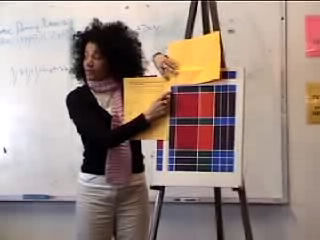Context
About Me
When planning for courses
and curriculum, I have to focus on creating a safe and structured
way for each individual to begin shedding their armor and feel
as if they can safely take risks mathematically and academically.
I have found that creating a student centered, hands-on, project
based curriculum with multiple forms of presentation and representation
provides the optimal structure for student learning when faced
with lethargy, hopelessness, and resistance in student behavior.
Teacher centered, lecture style, text driven curriculum does not
engage my students.
The impetus for my work comes
from two major concerns that are adversely affecting my students' overall success:
an educational experience laden with failure, a lack of motivation and a lack
of experience with academic language.
The lecture style approach that is
so characteristic of the educational system my students have experienced
prior to their arrival emphasizes memorization and rote skills
practice without providing much groundwork for the conceptual representations
of mathematics and how it models real life. I have observed my
students' body language, tone of voice, and level of participation
increase as they enter the classroom and see a bike or a piano
or a set of tools or algebra tiles. These items often bring about
laughter, inquiry, inflection, and movement. These affectations motivate
them to pursue mathematics. When teaching students who have traditionally
been labeled as incapable of learning, apathetic, and uninterested
in their own education, motivation is a major component of their
overall success and every lesson plan. When the task at hand becomes
interesting and relevant, students are more likely to engage than
to "check out." They begin to take risks, offering
their own conjectures and asking their own questions, soliciting the responses
of classmates, and being open to revision. As a result, the technical aspect
of mathematics is broached through the kinesthetic development of concepts
and ideas.
Secondly, the academic language needed
to express mathematics is often missing from students' repertoire. I often
find that asking my students to synthesize their knowledge so
that it may be applied appropriately acts as a stumbling block
for them and for me. They become irritated or defeated when presented
with words like investigate, evaluate, determine, justify, and
I become frustrated with their inability to take what I assume
they know and apply it as asked.
About My School
The unique structure of Life
Learning Academy is designed to reach some of the most
challenging and marginalized students in our country. Operated
by The
Delancey Street Foundation, Life Learning Academy is committed
to helping students develop healthy, productive, and independent
lives by teaching rigorous academic, social, and vocational
skills, and to instill positive community values through an"Each
One Teach One" philosophy. Students are expected to pass
on their newfound knowledge and mentor others while learning
how to change their lives.
 The Colors of Algebra
The Colors of Algebra